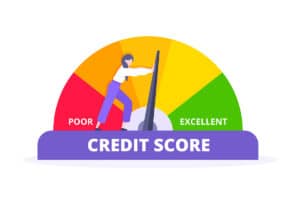Gladstone: 503-723-2130
Vancouver: 360-574-4424
Dick Hannah Dick Says Yes 1200 NE 95th St Vancouver, WA
May 11, 2022
Having a low credit score can make it difficult to buy a car. However, car buyers with bad credit scores manage to get approved for car purchases all the time. It just takes some planning to get the loan you want and the car you need. Taking some time to build your credit may help increase your chances of approval and reduce loan costs. But if you need a car now, taking steps like making a down payment and shopping around could help you find a loan that fits your needs and budget.
Your credit history is a big factor in getting approved for a car loan. Lenders use credit scores to estimate the likelihood that you will pay back your loan. The lower your scores, the more risk they believe they are taking on. In exchange for that risk, lenders will usually charge a higher interest rate.
Unfortunately, buying a car with bad credit is tough, even if you have the income and a stable job history. A history of late payments, high debt, bankruptcy, or repossession is a sign to the lender that you’re at risk of defaulting on your loan payments, and lenders want to avoid the expensive process of repossessing your vehicle.
How can I get financed for a car with bad credit?
These steps could help you improve your chances of getting approved for a car loan that fits your budget.
Check your credit
Your credit score is a huge factor when it comes to the interest rate and credit financing you will receive for your auto loan. Before you begin shopping for a car loan, check your credit from all three major credit bureaus before you begin your car shopping journey, so you have time to rebuild your credit if possible.
Check your credit reports for any incorrect information and dispute those errors. If possible, give yourself at least 30 days to dispute credit report mistakes before you start car shopping. Errors and fraud occur more often than you would expect and can weigh heavily on your scores. Fixing errors could bring your score up quite a bit.
Improve your score

There is no official minimum credit score you need to buy a car, but a higher score will open up more options and better rates. If your score is below 660, look for ways to improve your score before applying for a car loan. Paying off debt, clearing up errors, or taking care of old collection accounts could bump you over that coveted 700 threshold.
Delaying the car finance process to improve your poor credit score and rebuild your credit can save you money in the long run.
Make a big down payment
Saving for a down payment can come with several benefits. First, a down payment may help you qualify for an auto loan more easily, especially when you have low credit scores. Without a down payment, the lender takes on more risk since it may lose more money if you don’t repay the loan and it needs to repossess the car. Some lenders may require you to put some money down.
Plus, you’ll pay less interest with a down payment. The more money you put down, the less you’ll need to borrow for the car. That means you’ll pay interest on a smaller balance, lowering your total interest paid.
How much you have to put down on a car with bad credit depends on how low your score is (and why) as well as the price of the car and the dealer you’re working with.
Determine how much you can afford
You should know what you can afford to pay before you start shopping and stick to that amount even if you’re approved for a loan with bigger payments. Think beyond your monthly bills and loan payment and consider the costs of car ownership such as gas, maintenance, auto insurance, and any parking expenses, and factor those into your budget.
It may be tempting to stretch your loan term to six or seven years in exchange for a lower monthly payment. But keep in mind that a longer auto loan term means you could end up paying more in interest over the length of the loan — and you increase your risk of becoming upside-down on your loan, which can create some challenges when it’s time to sell or trade in your car because you’ll owe more than it’s worth.
Comparison shop
Shopping around and comparing rates and loan terms across lenders may help you find the best loan for your needs and your budget. You never know what options are available until you look.
If you have bad credit, here are some lenders you might consider.
Get pre-approved

Getting pre-approved for a loan could help make your car search easier. Knowing the pre-approval amount can help you stay on track and within budget while shopping.
The pre-approval process analyzes your income, expenses, credit score, and credit report and determines if you qualify for an auto loan from the lender and how much the lender would be willing to lend.
If approved, the lender lets you know how much you can finance, and you’ll be able to take pre-approval paperwork and information with you when you start shopping for a car.
Get a co-signer
Getting a family member or close friend to be a co-signer might be your best option to get a loan at a reasonable interest rate. You should consider getting a co-signer if you have bad credit, your income is lower than the minimum requirement for a car loan, your debt-to-income ratio is too high to qualify for a loan or you have variable income. A co-signer with good credit could give you a better chance of getting approved for a loan or may help you get a better loan rate and terms.
Your co-signer is responsible for making your monthly payment if you can’t fulfill your loan obligations, so only use a co-signer if you are confident you can make your payments in full and on time.
Get a shorter loan term
Longer loans are generally considered a higher risk: there’s more time for you to potentially default on the loan, so the interest rates tend to be higher. Generally, interest rates are lower for short-term loans, meaning you pay less for your car overall. Plus, you pay off your car loan earlier, which lets you focus on paying off other debts. The monthly payments will be higher for shorter loans, however, so make sure you are able to fit this into your budget with some room to spare.
Read the fine print
Loan documents can be confusing, but your money and your credit are on the line, so it’s important to take time to understand the terms of the loan. Make sure the paperwork matches everything verbally agreed to. If you agree to the terms, sign the loan documents before you drive the car off the lot.
Key takeaway
Whether or not you can get a car loan with bad credit depends on many factors. If you follow these tips, you may be able to get an auto loan and save money even with poor credit scores. No matter how desperate you are for a new vehicle, take your time, get all the facts, and make the most financially sound decision you can.
Contact Us